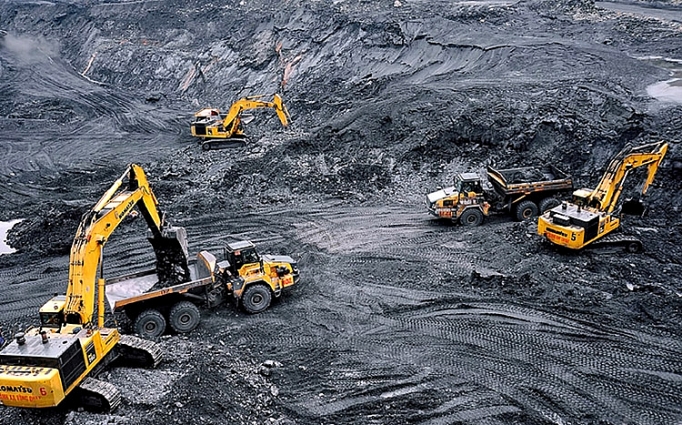Principles and conditions for grant of mining licenses in Vietnam
What are the principles and conditions for grant of mining licenses in Vietnam? What are the contents of the mining licenses in Vietnam– Quoc Cuong (Phu Yen)

Principles and conditions for grant of mining licenses in Vietnam (Internet image)
Regarding this issue, LawNet would like to answer as follows:
1. Principles and conditions for grant of mining licenses in Vietnam
- Grant of a mining license must adhere to the following principles:
= A mining license is granted only for areas in which no organization or individual is lawfully exploring or mining minerals, but not for areas banned or temporarily banned from mineral activities or areas of national mineral deposits;
= A mineral area in which large-scale mining can be effective may not be divided for the grant of mining licenses to many organizations or individuals for small-scale mining.
- To obtain a mining license, an organization or individual must satisfy all the following conditions:
= Have a mineral extraction project executed in the area where mineral exploration has been carried out and mineral reserves have been approved in conformity with relevant planning as prescribed by the law on planning. The mineral extraction project must include a plan for employing professional personnel, advanced and appropriate equipment, technology and mining methods. In case of extraction of hazardous minerals, it is required to obtain written permission from the Prime Minister;
= Having an environmental impact assessment report or an environmental protection commitment made under the environmental protection law;
= Having an equity capital at least equal to 30% of the total investment capital of the mining investment project.
- Business households may mine minerals for use as common construction materials or conduct salvage mining if they satisfy all the conditions set by the Government.
(Article 53 of the Mineral Law 2010, amended by Clause 12, Article 8 of the Law on amendments to some articles concerning planning of 37 laws 2018)
2. Contents of the mining licenses in Vietnam
- A mining license must contain the following principal details:
= Name of the licensed organization or individual;
= Kind of mineral, location and size of the mining area;
= Mineral deposits, capacity and method of mining;
= Mining duration;
= Financial and other relevant obligations.
- A mining license is valid for 30 years at most and may be extended multiple times with the total extension period not exceeding 20 years.
In case an organization or individual licensed for mining transfers the mining right to another, the mining duration is the remaining period of the mining license previously granted.
(Article 54 of the Mineral Law 2010)
3. Rights and obligations of organizations and individuals licensed for mining in Vietnam
- Organizations and individuals licensed for mining have the following rights:
= To use mineral-related information pertaining to the mining purpose and area permitted for mining;
= To mine minerals under the mining license;
= To further explore mineral deposits within the permitted area and depth and, before exploration, notify the volume and duration of such exploration to competent licensing state management agencies;
= To store, transport, sell and export the exploited minerals under law;
= To apply for extension or return of the mining license or return of part of the mining area;
= To transfer the mining right;
= To lodge complaints or lawsuits against decisions revoking the mining license or other decisions of competent stale agencies;
= To rent land under the land law according to the approved mining investment project or mine design;
= Other rights provided by law.
- Organizations and individuals licensed for mining have the following obligations:
= To pay a fee for the grant of the mining right, a licensing fee. royalties, taxes, and charges, and fulfill other financial obligations under law;
= To ensure the schedule of mine infrastructure construction and mining activities stated in the mining investment project and mine design;
= To register the date of commencement of mine infrastructure construction and date of commencement of mining with competent licensing state management agencies and notify them to People's Committees at all levels in the locality in which the mines are located before construction or mining;
= To exploit to the maximum main and accompanied minerals; to protect mineral resources; to ensure labor safety and sanitation and take measures to protect the environment;
= To collect and store information on results of further exploration for mineral deposits and on mining results;
= To report mining results to competent state management agencies under regulations of the Ministry of Natural Resources and Environment;
= To compensate for damage caused by mining activities;
= To create favorable conditions for other organizations and individuals to conduct scientific researches permitted by the State in the mining area;
= To close mines, restore the environment and rehabilitate the soil when the mining license expires;
= Other obligations provided by law.
(Article 55 of the Mineral Law 2010)
- Key word:
- mining licenses
- in Vietnam
- Cases of land rent exemption and reduction under the latest regulations in Vietnam
- Economic infrastructure and social infrastructure system in Thu Duc City, Ho Chi Minh City
- Regulations on ordination with foreign elements in religious organizations in Vietnam
- Increase land compensation prices in Vietnam from January 1, 2026
- Determination of land compensation levels for damage during land requisition process in Vietnam
- Who is permitted to purchase social housing according to latest regulations in Vietnam?
-

- Emergency response and search and rescue organizations ...
- 10:29, 11/09/2024
-

- Handling of the acceptance results of ministerial ...
- 09:30, 11/09/2024
-

- Guidance on unexploded ordnance investigation ...
- 18:30, 09/09/2024
-

- Sources of the National database on construction ...
- 16:37, 09/09/2024
-

- General regulations on the implementation of administrative ...
- 11:30, 09/09/2024
-

- Notable new policies of Vietnam effective as of ...
- 16:26, 11/04/2025
-
.Medium.png)
- Notable documents of Vietnam in the previous week ...
- 16:21, 11/04/2025
-
.Medium.png)
- Notable documents of Vietnam in the previous week ...
- 16:11, 02/04/2025
-
.Medium.png)
- Notable new policies of Vietnam to be effective ...
- 16:04, 02/04/2025
-
.Medium.png)
- Notable new policies of Vietnam effective from ...
- 14:51, 21/03/2025

 Article table of contents
Article table of contents
